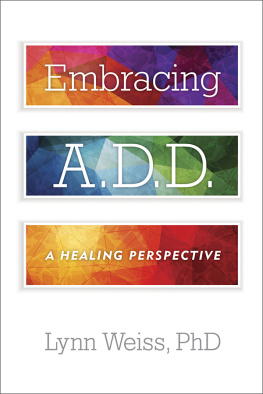The Caregivers Tale
The Caregivers Tale
Loss and Renewal in Memoirs of Family Life
ANN BURACK-WEISS

COLUMBIA UNIVERSITY PRESS NEW YORK
Columbia University Press
Publishers Since 1893
New York Chichester, West Sussex
cup.columbia.edu
Copyright 2006 Columbia University Press
All rights reserved
E-ISBN 978-0-231-51077-6
Library of Congress Cataloging-in-Publication Data
Burack-Weiss, Ann.
The caregivers tale : loss and renewal in memoirs of family life / Ann Burack-Weiss.
p. cm.
Includes bibliographical references and index.
ISBN 0-231-12158-x (alk. paper)ISBN 0-231-12159-8 (alk. paper)
1. CaregiversCase studies. 2. Chronically illHome careCase studies. 3. Chronically illFamily relationshipsCase studies. I. Title.
RA645.3.B86 2006
362.0425dc22
2005053776
A Columbia University Press E-book.
CUP would be pleased to hear about your reading experience with this e-book at .
To the memory of my parents,
Pauline Levinson Burack, 19081980
Robert Burack, 19031980
The stories we tell, and the ways that we tell them, are influenced by everyone weve ever known, and everything weve ever seen, heard, or read. What follows, then, can be only an incomplete list of my indebtedness.
I am most grateful to the mothers, fathers, sons, daughters, sisters, brothers, life partners, and friends whose memoirs form the basis of this study. Without their books mine would not exist.
After close to four decades in the social work profession, I think back to all the stops along the way: Community Service Society, Jewish Home and Hospital, Gay Mens Health Crisis (GMHC), Lighthouse International, Brookdale Center on Aging, and Columbia University School of Social Work. I have received more from clients than I ever gave, and learned more from students than I ever taught.
First-rate colleagues surrounded me at every turn. Among them were a few who became dear friends: Frances Coyle Brennan, Gertrude Elowitz, Lucy Rosengarten, Barbara Silverstone, Anna (Honey) Zimmer. As the years pass, many who offered wise counsel are gone. I think especially of Daniel Cohen, Rose Goldstein, and Carol H. MeyerI hear their voices still. Special thanks are due to Harriet Rzetelny, whose insightful comments on early drafts of the book helped immeasurably.
John Michel, at Columbia University Press, was the first person to whom I confided the nascent idea for what was to become my project. Although he did not live to see it to fruition, his initial encouragement made all the difference. Shelley Reinhardts good cheer and diligencewith the support of manuscript editors Kerri Sullivan and Susan Pensakgot me through the end zone.
Reading about other families brought me closer to my own. I honor my roots: grandmothers Rose Tuck Levinson and Fannie Lander Burack, who were children of the nineteenth century. I treasure my branches: granddaughters Danielle Nelson and Jennie Rose Nelson, who are children of the twenty-first century. And to the adored trio who grace my own small chunk of space and time in the universechildren Donna Weiss Nelson and Kenneth Weiss, and husband Roy L. Weissmy deepest thanks and love.
And the end of all our exploring
Will be to arrive where we started
And know the place for the first time.
T. S. Eliot, Little Gidding
Man survives because he cares and is cared for.... Civilization is, at least in part, a form of crystallized love.
William Gaylin
It is said that books in process take on a life of their ownmystified authors following their characters wherever they lead, unsure of where theyre headed until all is revealed on the final pages. But that is supposed to happen only in fiction. Little did I imagine when I began this project that its course would undergo such drastic revision before its end.
This was to be a book about the professional view of family caregivinga continuation and amplification of a theme I had introduced in a 1995 article in Social Work entitled The Caregivers Memoir: A New Look at Family Support. In that article I argued that the quantitative research that marks the field (centered primarily as it is on the concepts of stress and burden) fails to capture the complexity of the experience. I suggested that looking backwardafter time had distilled the significance of the eventcould allow the person who had served as caregiver to uncover the thoughts and feelings that exist below the radar of scientific inquiry. And I cited excerpts from a few published book-length memoirs to prove my point.
It was a topic close to my heart. For thirty years Id practiced clinical social work with ill and disabled people and their families. As daughter, wife, and mother, Id been involved in family care myself. All that Id experienced indicated that caregiving was not an intrusion on family life but an intrinsic part of it, a crucible in which the crux of relationships was revealed; an occasion not only of stress and burden, but of growth, possibility, and meaning. Over time, Id come to see independent living as an oxymoron, and to accept interdependence as the underlying order of life. Every family Id ever known had at least one story of care inextricably bound to its sense of identity. The years may have obscured or exaggerated the particulars but the essence remained. The depth, shading, and nuance that accompanied these stories were not to be found in the professional literature. Nor were answers to the questions that interested me most: How do family caregivers keep on keeping on? How do their views on family and on the meaning of life itself change over the course of caregiving? How can their hard-won wisdom be used to sustain others faced with the same challenges?
Using published memoirs as research texts seemed an obvious way to examine these questions. Authored by sons and daughters, spouses and life partners, parents and children, they provide reflective accounts of the experience of caring for ill and disabled family members. As a caregiver, Id drawn strength from reading the words of those who had passed that way before me. (In the words of a dearly remembered English professor, they spoke to my condition.) As a practitioner, Id sometimes suggested reading memoirs to my clients. And, in the tradition of Robert Coles (1989), who used fiction to develop the moral imagination of medical students, I assigned memoirs to the social work interns in my graduate school classes.
So tethered to the empirical literature was I that it seemed right to devote a major portion of the book to its review and to a discussion of the ways in which memoirs validated or contradicted the dominant paradigm of stress and burden. It seemed at first that an analysis of child-care, peer-care, and parent-care relationships in thirty book-length memoirs would do the job. I had no intention of moving beyond comparisonmuch less developing an overarching theoryin the process.
Many of the memoirs I chose to read featured caregiving in the sense that clinicians and researchers use the word: hands-on help with personal and instrumental tasks of daily living undertaken by one family member on behalf of anotherusually for a time-limited periodof greater or lesser durationof illness or disability. For it is generally understoodif not publicly acknowledgedthat most of the people occupying hospital beds today will not get well soon, as the greeting cards on the bureau command. Nor will they die just yet. They will get a little better and go home, get a lot worse and come back. Good days will follow bad days as energy and spirits wax and wane. Bad news will follow good news as diagnostic tests yield contradictory results and second and third opinions are solicited. And throughout this timehowever long it may lastill and disabled adults will depend on those closest to them for help with tasks they once performed independently. Or, in the case of young children, will require more parental assistance than is usual for their age.

 COLUMBIA UNIVERSITY PRESS NEW YORK
COLUMBIA UNIVERSITY PRESS NEW YORK






